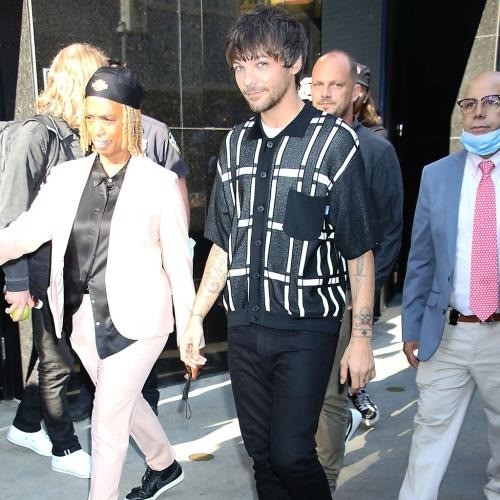News
Louis Tomlinson Outs Himself As Unnamed Celebrity Who Refused Photos On Robbie Williams Flight

Louis Tomlinson Outs Himself as the Unnamed Celebrity Who Refused Photo Requests on Robbie Williams’ Flight
Hook: When Silence Speaks Louder Than Selfies
A seemingly small moment aboard a plane has blossomed into something far more revealing: an insight into grief, fame, human boundaries—and the struggle to protect one’s own vulnerability under the glare of celebrity. Louis Tomlinson recently confirmed that he was the unnamed star referenced in Robbie Williams’ viral Instagram post — the one who declined photo requests mid-flight. What at first glance seemed like a fleeting anecdote has since opened a window onto the emotional realities of modern fame.
The Incident: Robbie Williams, Cabin Crew, and a Mystery Passenger
Robbie’s Instagram Revelation
Earlier in 2025, Robbie Williams posted on Instagram about a moment on a flight where cabin crew members asked him for selfies. He then mentioned that another celebrity on board had refused — and that someone had said, “He’s much nicer than that other celebrity who declined photos.” Robbie never named the person, though he expressed sympathy: “He’s a lovely lad, who knows what was going on in his world that day.” music-news.com
Louis Steps Forward
In a recent interview with Rolling Stone (and later reported in media outlets), Louis Tomlinson acknowledged that he believed he was the unnamed celebrity Robbie had referenced. music-news.com+2Yahoo News UK+2 Louis explained that at the time of the flight, he was deep in grief — and emotionally raw. He said that declining the photo was not about attitude or arrogance, but about protecting himself in a fragile moment. music-news.com
Louis said, “I was right in the middle of my grief. I felt cross with the world, to be honest.” music-news.com He admitted that in such a moment, there is “no answer other than ‘Sorry, I’m a c**t’,” because no excuse seems sufficient or genuine. music-news.com He added that he had instead offered to sign something — but that today’s fans prefer photos, because they can post them instantly online. music-news.com
He also reflected on how these small interactions can feel huge to a person under emotional strain: “You just think, ‘All I was doing there was trying to protect myself.’” music-news.com
Understanding the Layers: Grief, Identity & Public Expectation
Celebrity and the Demand for Access
In the popularity-driven culture of superfans and social media, celebrities often face relentless expectations to always be accessible. Spontaneous selfies, impromptu greetings, autograph requests — these can become emotional tax. The assumption many hold is that being famous means being perpetually available. But as Louis’ disclosure shows, that assumption overlooks the private inner life of public figures.
The Weight of Grief
Louis’ admission that the flight incident happened during a period of grief adds a poignant dimension. Grief can make even everyday social interactions harder. Moments that might seem trivial to others — a request, a refusal — carry more emotional charge. By explaining his mental state, Louis shifts the framing: this wasn’t arrogance, but vulnerability. He suggests that empathy should be extended, even to stars.
Psychological Self-Defense
Declining a photo isn’t always about rejecting fans; sometimes it’s about preserving personal energy. Louis called it “protecting myself.” Rather than isolate completely, he tries to “push through” and remain open to the world, but he also acknowledges that saying no sometimes is necessary. Yahoo News UK+1
Cultural Impact & Fan Reactions
From Speculation to Humanization
Once fans and media knew the unnamed celebrity might be Louis, the tone of discussion shifted. What was once a passing celebrity anecdote became a deeper conversation around mental health, boundaries, and grief in public life. Fans expressed support and empathy, seeing not just the celebrity but the person beneath.
A Mirror to the Fan-Celebrity Dynamic
The incident has sparked broader conversations: Do fans have a “right” to access? Are public figures obligated to accommodate all requests? Louis’ situation adds nuance: not every refusal is “bad behavior,” and celebrities navigating emotional hardship deserve space. Many commentators and fans have used this moment to reflect on how fandom culture sometimes dehumanizes its objects of admiration.
Comparisons in Pop Culture
This isn’t the first time celebrities have declined public demands. From refusing interviews to skipping meet-and-greets, others (in rock, pop, indie scenes) have drawn criticism or backlash for turning away fans. Louis’ openness, however, pushes this from anecdote to lesson: a refusal is valid, especially when it safeguards mental health.
What This Says About Fame in 2025
Boundary Culture
As we progress into a new era of celebrity, more stars are drawing firm lines around public access. The expectation that every moment must be documented, shared, and liked is being challenged. Louis’ case may be small, but symbolically it suggests boundaries are necessary for sanity.
Mental Health Normalization
Famous or not, we all wrestle with grief, anger, exhaustion. By talking openly about emotional hardship — especially in seemingly trivial settings like a flight — Louis helps destigmatize the inner struggles of those in public view. It pushes fans to see celebrities not as icons but as human.
The Power of Self-Narrative
By acknowledging he was the person in question, Louis reclaimed the narrative. Before, Robbie’s post was the only frame through which fans saw the event. Now Louis’ voice adds context, complexity, and compassion. In the social media age, controlling one’s story is an act of agency.
Beyond the Story: Why Fans Should Care
- Empathy over entitlement: This story reminds fans that connection works better when empathy is mutual.
- Mental health awareness: Even at the height of fame, artists struggle.
- Respect for boundaries: Infrastructure (flights, concerts, interviews) needs space for human agency.
- Narrative humility: Media often simplifies celebrity behavior — but the full story is richer.
Final Thoughts & Invitation (CTA)
Louis Tomlinson’s decision to identify himself as the celebrity who declined photos on Robbie Williams’ flight may seem small in the grand world of music headlines — but it carries weight. It is a quiet testament to grief, to boundaries, and to the emotional complexity behind celebrity.
If this story resonates with you — whether as a fan, a listener, or an observer of pop culture — I invite you to reflect:
- How do you respond when a public figure says “no”?
- Can you offer empathy rather than judgment?
- What does it mean for you to protect your own boundaries?
If you enjoyed this deeper dive, feel free to share it on social media, comment with your thoughts, or ask me to write similar explorations about other artists. Let’s keep the conversation alive — music is more than songs; it’s humanity.
